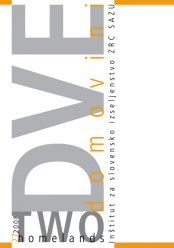Kolektivni spomin spreminjajočih se identitet: Študija z razpadom Jugoslavije povezanih spominov in identitet
Ključne besede:
socialni/kolektivni spomin, identiteta, naracija, socialne predstave, razpad nekdanje JugoslavijePovzetek
Prispevek skozi analizo spominov na pomembnejše dogodke razpada Jugoslavije obravnava razlike v kolektivnih spominih ter socialnih predstavah različnih generacij Slovencev ter drugih pripadnikov nekdanjih jugoslovanskih narodnosti, ki danes živijo v Sloveniji. Rezultati kvalitativne analize osemnajstih pol-strukturiranih intervjujev prikazujejo nasprotujoče si intepretacije razpada, spomine in predstave o Titovi Jugoslaviji ter spremembe na področju socialne (predvsem etnične) identifikacije.
Prenosi
Literatura
Bajt, Veronika (2003). From Nation to Statehood: The Emergence of Slovenia. Unpublished Ph.D. Thesis. University of Bristol, UK.
Bašić-Hrvatin, Sandra (1997). The Role of the Media in the Transition. Making a New Nation: The Formation of Slovenia (eds. Danica Fink-Hafner & John R. Robbins). Dartmouth: Aldershot: 267–277.
Bourdieu, Pierre (1999). The weight of the world: social suffering in contemporary society. Cambridge: Polity Press.
Brockmeier, Jens (2002). Remembering and forgetting: Narrative as cultural memory. Culture & Psychology, 8 (1): 15–43.
Bruner, Jerome (1990). Acts of meaning. Cambridge, MA: Harvard University Press.
Deschamps, Jean-Claude (1982). Social identity and relations of power between groups. Social Identity and Intergroup Relations (ed. Henry Tajfel). Cambridge: Cambridge University Press: 83–95.
Duveen, Gerard (2000). Introduction: The Power of Ideas. Social Representations: Explorations in Social Psychology (ed. Serge Moscovici). Cambridge: Polity Press: 1–17.
Duveen, Gerard (2001). Representations, Identities and Resistance. Representations of the Social (eds. Kay Deaux and Gina Philogène). Oxford: Blackwell: 257–270.
Flick, Uwe (1998). The Psychology of the Social. Cambridge: Cambridge University Press.
Flick, Uwe (2002). An Introduction to Qualitative Research. London: Sage.
Halbwachs, Maurice (1992 [1952]). On collective memory. Chicago: University of Chicago Press.
Jovchelovitch, Sandra. (2002). Social representations and narrative: Stories of public life in Brazil. Narrative Approaches in Social Psychology (eds. Janos Lázsló & Walter S. Rogers). Budapest: New Mandate: 47–58.
Jovchelovitch, Sandra & Bauer, Martin (2000). Narrative Interviewing. Qualitative Researching with Text, Image and Sound: A Practical Handbook (eds. Martin Bauer & George Gaskell). London, UK: Sage: 57–74.
Jović, Dejan (2004). ‘Official memories’ in post-authoritarianism: an analytical framework. Journal of Southern Europe and the Balkans, 6 (2): 97–108.
Judah, Timothy (1998). The Serbs: History, Myth and the Destruction of Yugoslavia. New Haven: Yale University Press.
Kansteinter, Wolfgang (2002). Finding Meaning in Memory: a methodological critique of collective memory. History and Theory, 41: 179–197.
Mayring, Phillip (2004). Qualitative content analysis. A Companion to Qualitative Research (eds. Uwe Flick, Eric von Karldorff, & Ingrid Steinke). London: Sage, 114–223.
Middleton, David & Edwards, Derek (1990). Collective Remembering. London: Sage.
Mishler, Elliot G. (1986). Research Interviewing: Context and Narrative. Cambridge, MA: Harvard University Press.
Moscovici, Serge (1973). Foreword. Health and Illness (ed. Claudine Herzlich). London: Academic Press: 1–25.
Moscovici, Serge (2000). Social representations: Explorations in Social Psychology (ed. Gerard Duveen). New York: NY University Press.
Paez, Dario, Basabe, Nekane & Gonzales, Jose-Luis (1997). A cross-cultural approach to remembering. Collective memory of political events: Social psychological perspectives (eds. James W. Pennebaker, Dario Paez, & Bernard Rime). Hillsdale, NJ: Lawrence Erlbaum Associates: 147–174.
Pušnik, Maruša (1999). Konstrukcija slovenske nacije skozi medijsko naracijo. Teorija in Praksa, 36(5): 796–808.
Pušnik, Maruša (2003). Državotvorje, politike reprezentacij in nacionalne mitologije: mediji in iznajdba slovenskosti. Raziskovalno delo podiplomskih študentov v Sloveniji - ena znanost: e-zbornik (ed. Marta Klanjšek). Ljubljana: Društvo mladih raziskovalcev Slovenije: 296–307.
Pušnik, Maruša (2004). Novičarsko upravljanje z javnim mnenjem. Teorije in Praksa, 41(3/4): 678–689.
Ricoeur, Paul (1985). Time and Narrative. Chicago: University of Chicago Press.
Schwartz, Barry (1982). The Social Context of Commemoration: A Study in Collective Memory. Social Forces, 61(2): 374–402.
Sekulić, Duško, Massey, Garth & Hodson, Randy (1994). Who Were the Yugoslavs?. American Sociological Review, 59(1): 83–97.
Strauss, Anselm (1987). Qualitative analysis for social scientists. Cambridge, UK: Cambridge University Press.
Strauss, Anselm & Corbin, Juliet (1994). Grounded Theory Methodology: An overview. Handbook of Qualitative Research (eds. Norman K. Denzin & Yvonna S. Lincoln). London, UK: Sage: 273–285.
Wertsch, James (2002). Voices of Collective Remembering. Cambridge, UK: Cambridge University Press.
Prenosi
Objavljeno
Kako citirati
Številka
Rubrike
Licenca

To delo je licencirano pod Creative Commons Priznanje avtorstva-Nekomercialno-Brez predelav 4.0 mednarodno licenco.
Avtorji jamčijo, da je delo njihova avtorska stvaritev, da v njem niso kršene avtorske pravice tretjih oseb ali kake druge pravice. V primeru zahtevkov tretjih oseb se avtorji zavezujejo, da bodo varovali interese založnika ter da bodo povrnili morebitno škodo.
Podrobneje v rubriki: Prispevki





